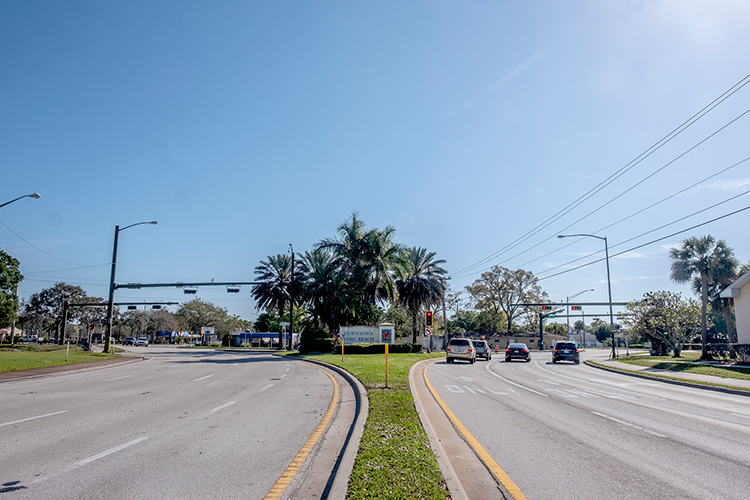
Apparently, our County Commission isn’t going to give us any formal declaration of its opposition to the ill-conceived and shortsighted proposal to reduce lanes along the Twin Pairs through downtown Vero Beach.
But we probably don’t need one.
If Florida Department of Transportation officials have been paying attention to the overwhelmingly negative reception the proposed lane reduction has been getting from the community, they’ve already seen that nobody here wants it.
Well, almost nobody.
There are a few folks – almost all of them having some vested interest in the downtown area – who enthusiastically support the proposal. Three of them happen to be seated on the Vero Beach City Council, providing the wrongheaded majority needed to create the false impression that the lane-reduction concept was gaining traction.
But it wasn’t.
And it isn’t.
Based on what we’ve seen and heard at the first two public workshops – one sponsored by the City Council and held last month at the Vero Beach Community Center, the other conducted in conjunction with last week’s county Metropolitan Planning Organization meeting – the opponents to the proposal greatly outnumber its proponents.
There’s little reason to believe the final two workshops, scheduled for Nov. 16 at the Community Center and Dec. 12 at City Hall, will produce different results.
And for one very compelling reason: City and county residents realize reducing lanes of traffic will do nothing to enhance the viability of the downtown area, but will unnecessarily manufacture a traffic nightmare, especially during the community’s busy season.
It’s fair to say, in fact, the potential damage done by the lane reduction along that strategic stretch of State Road 60 will be felt most by county residents who live outside the Vero Beach city limits but regularly travel into and through the downtown area.
That’s why – with two City Council members likely to ignore the will of all of the people and persist in their misguided-but-fierce embrace of the lane reduction through the panel’s Dec. 12 vote – our county commissioners needed to take a position.
And finally, they did.
The commissioners’ dissent didn’t come in the form of a resolution, which would have sent a powerful message to FDOT, nor did it come entirely at the MPO meeting last week, when the city’s consultant, Kimley-Horn & Associates’ Vero Beach office, presented the findings of its lane-repurposing study.
But their voices were heard.
“I think we spoke loud and clear,” Commission Chair Joe Earman said. “The FDOT folks were at that MPO meeting. I’m sure they heard us.
Earman was joined by Commission Vice Chair Susan Adams and commissioners Joe Flescher and Deryl Loar in expressing opposition to the lane reduction, and they cited a variety of reasons.
The lone holdout was Commissioner Laura Moss, a former Vero Beach mayor and council member – but not because she endorses the proposal.
Moss, who is being challenged for her District 5 seat in next year’s election by unwavering lane-reduction opponent and City Council member Tracey Zudans, said she didn’t comment because the MPO meeting was held less than 24 hours after a joint workshop between the county commission and the city council.
She said she would’ve “felt awkward” publicly opposing the proposal after a workshop that was conducted in a “very pleasant manner” and produced a “very worthwhile exchange.”
Also, she didn’t believe she should offer her opinion before all of the community had the opportunity to comment.
Besides, she added, “This has gone on for decades. This is not the kill-the-zombie moment. This is not a once-and-for-all decision.”
Pressed for her opinion, though, Moss noted the proposal’s projected cost to the city – an estimated $2 million to $4 million – and wondered, “Who’s going to pay for this?”
She also questioned the need for another Twin Pairs traffic study, which cost city taxpayers $165,000, and asked, “What are we trying to accomplish?”
Moss said she had read the latest Kimley-Horn study, which cost city taxpayers $165,000, and “didn’t see any new information to warrant the lane reduction,” adding, “I don’t see where the facts – or the community’s interest – has changed.”
They haven’t, really, other than the expected increases in vehicular traffic along the Twin Pairs, though the Kimley-Horn study found that the roadway, if reduced to two lanes in each direction, still would have the capacity to handle the current and anticipated volume.
If anything, the county’s growth seems to have generated more opposition from residents who challenge the wisdom of those who want to reduce lanes along the area’s most-traveled east-west corridor at a time when our population continues to increase, particularly to the west of Vero Beach.
The commissioners reminded the audience that State Road 60 serves as a major evacuation route when hurricanes threaten the community, adding that the roadway will provide access to the planned Three Corners project.
They also questioned the bogus claim made by the City Council’s lane reductionists – Vice Mayor Linda Moore and councilmen John Carroll and Rey Neville – that reducing lanes along the Twin Pairs is crucial to any plan to revitalize the downtown area.
For what it’s worth: Carroll continued to champion the proposal during last week’s council meeting, treating the audience to a presentation that included a slide show of Vero Beach’s 2005 Vision Plan and photographs comparing our downtown to those in other Florida cities, such as Winter Garden, Winter Park, Melbourne, West Palm Beach, Delray Beach, Fort Lauderdale and Naples.
“It’s just common sense, folks,” Carroll said of the need for the lane reduction.
By the time Carroll was done last Tuesday, the council had spent another 45 minutes on a proposal that should be going nowhere. But don’t expect him to back down.
Look for Carroll to continue telling us what we should do, rather than follow the County Commission’s lead and listening to what the community is telling him.
Not that it matters.
By now, FDOT should’ve heard enough.



